Online publishing platforms, like Medium, made online writing affordable and straightforward.
You don’t have to spend time and resources creating your digital space. Instead, Medium can help you set up a simple blog in a few minutes. It attracts new writers who want to make money writing on Medium.
Medium has roughly 165 million monthly visits, where over 57% of total traffic comes from organic search, according to Similarweb.
As a marketer and content writer, I use Medium for SEO, lead generation, blog post writing, and website promotion. I know authors who switched to entrepreneurship and built six-figure businesses using Medium.
Now, I want to share how you can create searchable content on Medium to boost your website’s traffic and build a personal brand.
This article covers the following:
- What SEO article is
- Does SEO matter on Medium?
- Does reposting a blog post on Medium hurt your SEO?
- Medium vs. Self-hosted blog for SEO
- How to use Medium for SEO
What is an SEO article?
Besides sharing valuable insights and converting readers into subscribers, an SEO article has one more goal — to rank high on the search engine results page.
Every SEO article starts with keyword research, which distinguishes SEO writing from blogging. Keyword research helps discover queries and search terms people use when doing online searches. Furthermore, keyword research is a whole science you should dive into to create optimized content.
You are reading an SEO article I wrote and optimized to rank for the “SEO Medium” keyword. Regardless of where you publish your content, it can rank well on Google if you apply the on-page optimization strategies.
My website had around ten optimized articles ranking on the second Google search results page. I also have several SEO-optimized Medium articles that rank well and continuously attract new users.
I’ve been writing on Medium for several years. By now, I have over 260 published blog posts and data about which topics work well on Medium. As a top writer on Medium, I recommend you invest a bit of your time learning the platform before using the Medium platform to build an SEO blog.
Below, I share my opinion, experience, and several case studies on Medium SEO writing and what outcome you might expect from doing Medium SEO.
Does SEO matter on Medium?
Medium website is a free blogging platform where you can set up an account in a few minutes and reach thousands of readers with your content.
Medium uses an algorithm to recommend relevant stories to readers. The more Medium members read your content, the higher your paycheck will be.
If you want to make money writing, you don’t need to do SEO optimization on Medium. Instead, you should follow the proven strategies on Medium. My best-performing Medium blog posts are not SEO optimized. They have catchy titles and helpful content resonating with readers.
If your goal is to generate leads and build a business using Medium, then SEO for Medium articles can be a helpful strategy to achieve your goals.
Nowadays, roughly 30% of my website traffic is from Medium. It’s a lot! I achieved it by publishing several articles a month in Medium reputable publications.
Besides referral traffic, I also grow my email list on Medium. Emails allow direct and personalized communication with the target audience. Even if you don’t have a product or service yet, do nurturing first! In time, you’ll figure out your audience’s pains and needs and develop a customized solution.
How do I get email subscribers on Medium? Through CTAs (call to action).
I put the following CTA with a free ebook offer at the end of every blog post:
“Download my free guide with 5 proven ways to make money writing that will let you work for yourself from home even if you have zero former experience.”
If your goal is to promote your existing business through Medium, SEO for Medium articles will help you passively attract readers from organic search and gain relevant email subscribers.
Does reposting a blog post on Medium hurt your SEO?
Many established writers I know run personal websites and occasionally post on Medium. They don’t necessarily aim to earn a lot on Medium. Instead, they repost content on Medium to raise awareness about their brand, build backlinks to their website and boost traffic.
Good content is worth spreading, especially if you can make additional income out of it. That’s my opinion. I don’t mind using Medium to meet some business KPIs. However, it’s even better if you can make extra money along the way. I will show you how you can do it on Medium.
First, let me share my experience-based opinion on the following widespread concern: is it good for SEO to republish content from your blog to Medium?
Webmasters are concerned about republishing their content on Medium because of duplicate content. They know that Google introduced the Panda algorithm in February 2011, intended to lower the rankings of low-quality websites, content farms, and sites with duplicate content.
People assume their websites might get penalized if their content is not original or has already been published elsewhere. This concern has been around for a decade.
Here is what Google says about it:
“Duplicate content on a site is not grounds for action on that site unless it appears that the intent of the duplicate content is to be deceptive and manipulate search engine results. If your site suffers from duplicate content issues, we do a good job of choosing a version of the content to show in our search results.”
Besides giving a clear answer that should have calmed down anxious webmasters, Google has recommended a solution that works for Medium SEO.
If you want to republish your SEO articles on Medium, you’ll have to “show” the primary content source using the rel=”canonical” link element. This way, Google will understand that your republished content is a copy of an existing page available elsewhere. Besides, it won’t rank duplicate content above your website’s content even if that website’s DR (domain rank) is higher than yours. Let me explain it using my SEO Medium case studies.
Medium is a massive website with a 94/100 domain rank, according to Ahrefs.
My website, selfmademillennials.com, is brand new with an 8/100 domain rank, according to Ahrefs.
If two identical blog posts are published on both of the mentioned websites, Google will index Medium content first and rank it above my website. It happens because Google trusts Medium more.
If you want to use Medium to boost your website’s ranking and benefit from SEO links from Medium, you’ll better use the rel=”canonical” link element recommended by Google. I outlined all the steps you have to follow below:
1. Create and publish SEO-optimized content on your website.
2. Wait for Google to index your page. You can check the index status in Google Search Console. The following message indicates that your page was crawled and added to Google’s main index. It might take several hours or even days to index new content on your website. The speed depends on your website’s age and content publication frequency.
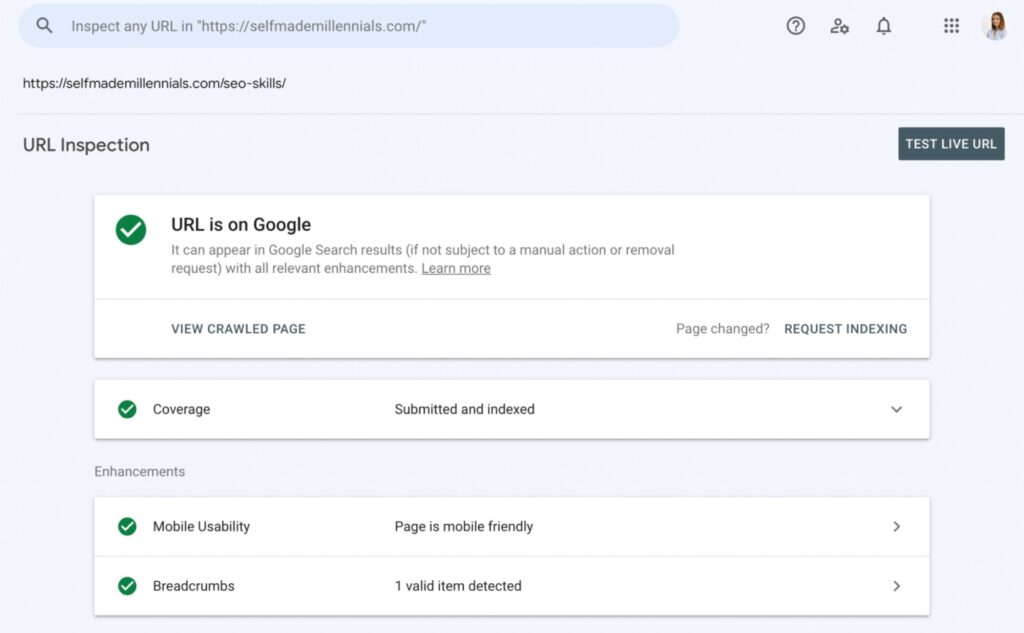


3. Publish your article on Medium to boost your website’s SEO.
4. Navigate to the “advanced story settings” and add a canonical link that indicates the original content source.
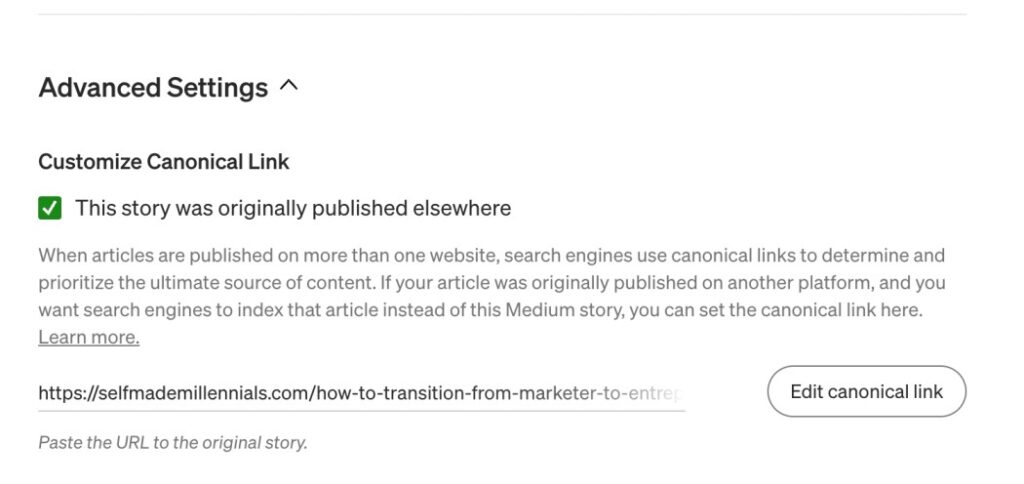


5. Use Medium as a blog to boost your website’s search rankings. Link from Medium to your website and redirect the traffic. This way, search engines will follow your instructions and display your website in the search results, while Medium will serve as a booster for your SEO.
Medium vs. Self-hosted blog for SEO
Medium is a fantastic writing platform.
Your content can easily reach thousands of people right after hitting the publish button. However, there is one tiny drawback — you can’t set your rules. You should always comply with the Medium regulations to share content with your readers.
As a creator, you cannot include ads in your content, properly do affiliate marketing or publish sponsored undisclosed posts. These are just a few examples.
A personal website seems more lucrative than Medium. You define your rules, and you are not limited in the monetization types. You are your boss! Freedom is attractive, but it comes with some challenges.
A brand new website has no traffic and trust from Google. Unlike Medium, no one will be able to discover your new content upon publication. You will have to work continuously for at least six months to achieve some degree of visibility in search.
Challenging work and uncertainty restrain people from launching their websites. They all want instant results, while delayed gratification is not attractive.
As a marketer and content writer, I can’t say one platform is better than the other. Both, Medium and a self-hosted website have their pros and cons. I highlighted them in the table below for your convenience.
Blog on Medium
| Pros | Cons |
|---|---|
| An established platform with roughly 165 million monthly visitors. | You have to comply with Medium rules when creating and sharing your content. |
| Approximately 25% of all visitors come from the USA. | You cannot advertise products and services. |
| Medium website’s domain rank is 94, according to Ahrefs. Your articles have a great chance to rank high if you do some SEO on Medium. | You should always disclose affiliate links and sponsored content. |
| Setting up an account and publishing your first blog post takes a few minutes. | The monetization types are somewhat limited. |
| You are paid for Medium members’ reading time. | You don’t own the platform. If Medium disappears one day, all your achievements are gone. |
Self-hosted blog
| Pros | Cons |
|---|---|
| You own your website and set up your rules. | You should possess particular skills to grow a website from zero, such as SEO, writing, and link building, to name a few. |
| You can create and share any content on your blog. | It takes at least six months to see the first SEO results. |
| You are not limited in the monetization types. You can monetize your website the way you want. | Managing a self-hosted blog is challenging, especially if you do it next to your full-time job. |
| Your website can become a sustainable business in the long run. | You should create content based on keyword research. |
Using Medium as a blog can help you achieve the desired results and organic rankings faster. However, a self-hosted site can be customized to your needs and create more opportunities in the long run.
If you cannot decide between a Medium blog or an internal blog for SEO, perhaps, my example can inspire you.
I’ve reached over 300,000 readers on Medium worldwide. I primarily use Medium for lead generation and to help my website grow. In particular, I write about SEO, which is my niche topic, and redirect the targeted traffic from Medium to my website.
I also have a few marketing stories that rank at the top of Google search results, continuously bringing new users to Medium and new subscribers to my email list.
I use Medium as a tool to build and grow my website. I want to set and follow my own content rules, and I can only do it if I own a website.
If I need to choose between WordPress and Medium for SEO, I will pick my own blog. This is how Self Made Millennials was born in August 2021.
How to use Medium for SEO
If you decide to do SEO optimization for Medium, this short guide will be helpful for you.
I’ve seen many long and comprehensive posts explaining how to SEO optimize Medium content, but it should not be perceived as a challenging task. In fact, you have to follow a simple SEO Medium tutorial to create optimized content. I’ll show you how.
The following factors affect SEO on Medium that you should be aware of.
1. Start with an idea
A distinct difference between blogging and SEO writing is keyword research. A topic idea is not enough to create well-performing content. You have to use content writing tools for SEO to conduct simple keyword research. This article explains which paid and free tools you can use for keyword research.
I use Ahrefs to conduct keyword research and collect semantically related keywords. Here is the list of search terms I gathered to create this article on the “SEO Medium” keyword:
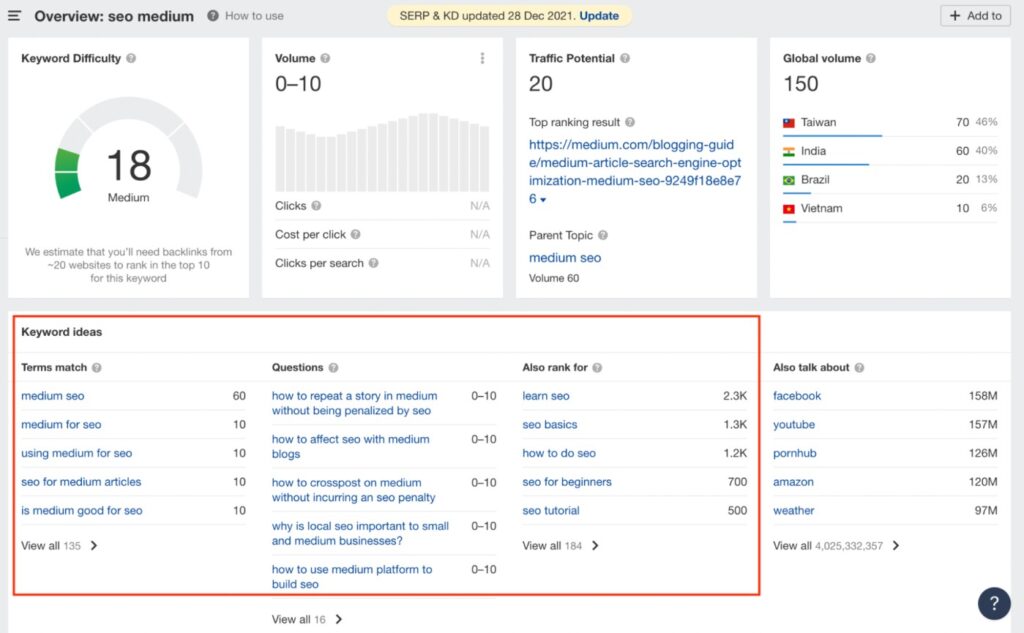


As a first step, your task is to collect as many keywords related to your topic as possible. Google favors clear, easy-to-read, and in-depth content. Therefore, short posts won’t bring you the designed results on Medium for SEO.
2. Check who’s on top
If your goal is to rank on the first Google search result page, you have to know who you are competing with, what content is already there, and what you can do better.
You can google your search query to see who shows up on top. This way, you can collect ideas and estimate the length of your future content.
Have you already spied on your competitors in search? Great! Let’s move on to the next step.
3. SEO Medium writing
Most writers disregard the first two steps and start writing whenever a new idea comes.
It would be terrific if you could create helpful and engaging content. However, you won’t manage SEO optimization on Medium if you don’t do keyword and competitor research.
Once you have a bunch of keywords with their monthly search volumes and difficulty, you can start writing.
You should include your keywords in the title, according to the SEO best practices. Ensure you include your keyword as close to the title beginning as possible. Please note that the Medium and SEO titles are not the same thing! You can create a catchy title to hook Medium readers, but use the story settings to SEO optimize your Medium post.
Here is one of my top-performing blog posts in search with over 27k views:
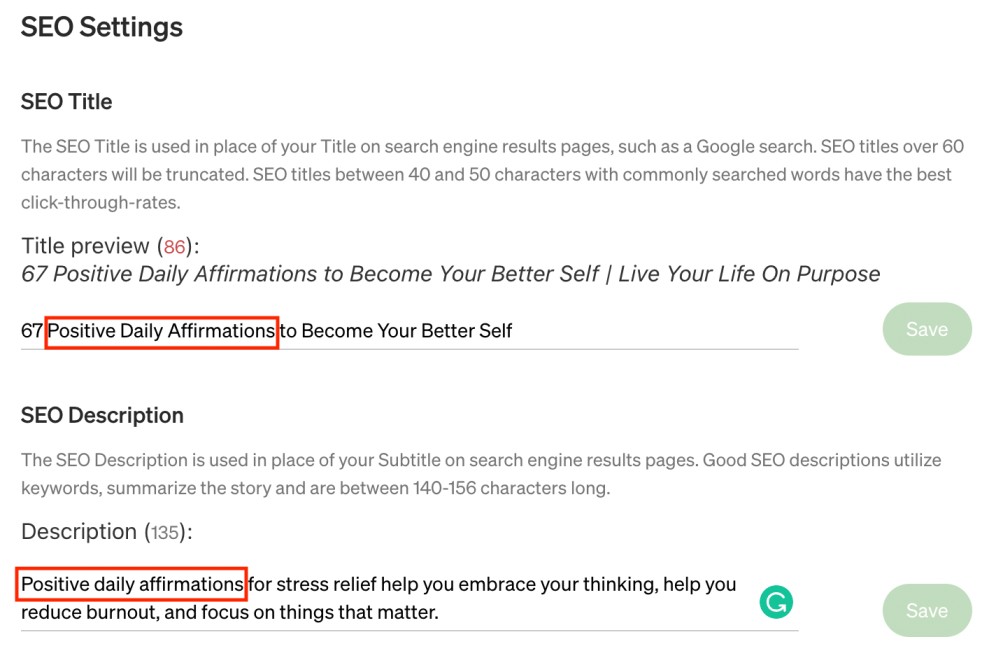


2. Optimize the introduction
Google bots mimic human behavior and crawl content from top to bottom. You have to make sure your introduction contains a few semantically related keywords to explain to Google what your SEO article is about.
For instance, if I write about “positive daily affirmations,” my semantically related keywords are the following:
- Self-affirmations (my post ranks 8th for this keyword on Google)
- Powerful daily affirmations (my post ranks 4th for this keyword on Google)
- Best affirmations (my post ranks 11th for this keyword on Google)
- Etc.
My Medium SEO article ranks for 440 organic keywords on Google. Besides, Medium’s high DR (domain rank) helped push the article to the top.



3. Optimize sub-headlines
How do you read content online? Chances are you skim the headlines to decide whether it’s worth reading further. Like humans, bots follow the same logic. Sub headlines or H2 are among the top spots checked by the Google bot to better understand the content. Therefore, it’s worth putting your keywords into the sub-headlines.
4. What about the URL structure?
Medium uses your story’s title to create a page link by default. Long and complex URLs are not in line with Google’s best practices. Therefore, it is worth customizing your link whenever you publish a new SEO article on Medium or your blog.
Likely, you can create SEO links from Medium and customize them. Note, you can only customize your URL before publishing a blog post in your advanced story settings (see example below). Medium has a detailed guide on how to do it for your convenience.
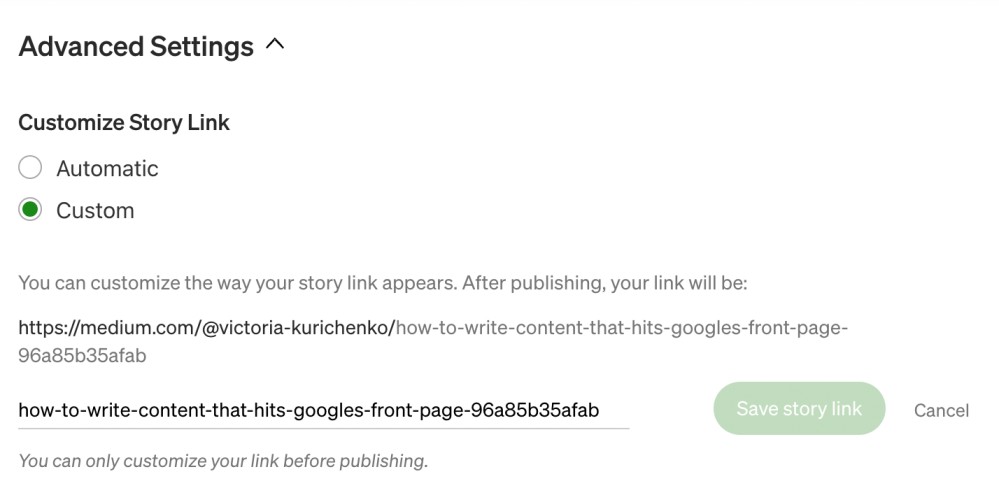


I’ve also included an excerpt from Google Search Central about URL structure and SEO to help you learn more about Google’s best practices.
“Google is good at crawling all types of URL structures, even if they’re quite complex, but spending the time to make your URLs as simple as possible is a good practice.
Use words in URLs
URLs with words that are relevant to your site’s content and structure are friendlier for visitors navigating your site.
Avoid:
- Using lengthy URLs with unnecessary parameters and session IDs.
- Choosing generic page names like page1.html.
- Using excessive keywords like baseball-cards-baseball-cards-baseballcards.html.
Links on your page may be internal—pointing to other pages on your site—or external—leading to content on other sites. In either of these cases, the better your anchor text is, the easier it is for users to navigate and for Google to understand what the page you’re linking to is about.”
5. Don’t forget about visuals
Images, tables, graphs, and infographics improve the reading experience and help break the long blocks of text.
Images visualize your writing and help readers better understand your content. Therefore, I recommend you include a few pictures in your article. Although, it’s not necessary to blog on Medium. It’s rather crucial for SEO on Medium.
Google cannot see and understand images just yet. For this reason, they’ve introduced an alt tag. It’s used to describe images for search engine bots and readers with visual impairment.
As a part of the SEO strategy on Medium, I recommend adding alt tags to your images. Here is how you can do it.
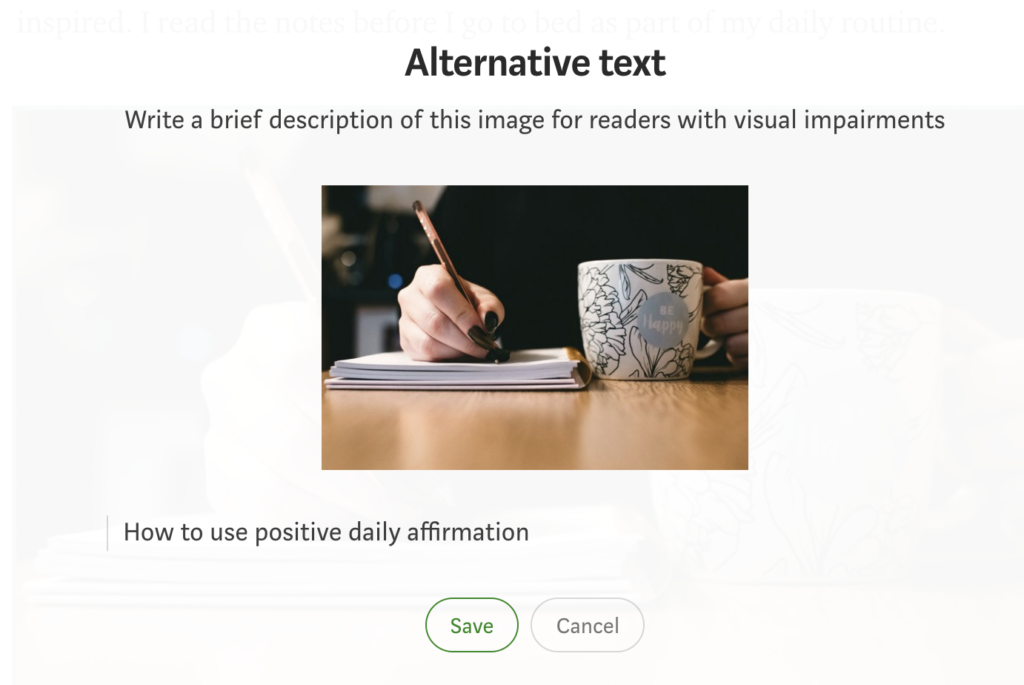


Note, I’ve added an image description that contains the “positive daily affirmation” keyword. If you want to do SEO optimization on Medium, make sure to add alt tags to all your images.
If you do SEO Medium optimization well, users will discover your content through organic search. At the same time, you’ll uncover a new, continuous, and passive traffic generation channel.
Good luck with your SEO Medium blog, and feel free to share your questions in the comments if you have any.



Hello there!
My name is Victoria.
I am an SEO expert, Medium top writer, solopreneur, and the founder of Self Made Millennials. I help companies create optimized content and attract potential customers through organic search results. In addition, I share how content creators can monetize their writing skills.
Latest posts
SEO writing How to Make Money From SEO In 2024 written by Victoria Kurichenkoupdated on October 16, 20221 in 3 Americans run a side hustle next to their full-time job, according to Zapier research, and the number of side hustlers is steadily growing! Someone works overtime because the main job …
Creator tools How to Make Money on Medium Website In 2024 written by Victoria Kurichenko updated on November 6, 2023 I’ve been writing on Medium since March 2020. When many writers struggled with low performance and eventually quit, I kept writing on Medium. I’ve grown my blog to 13,000+ subscribers …


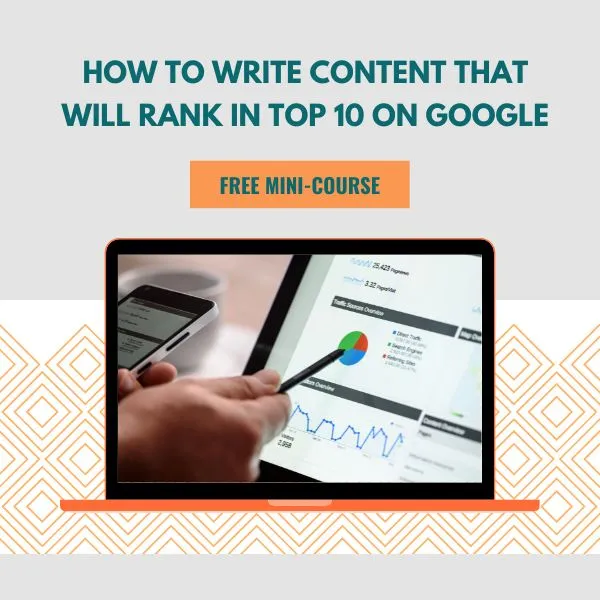
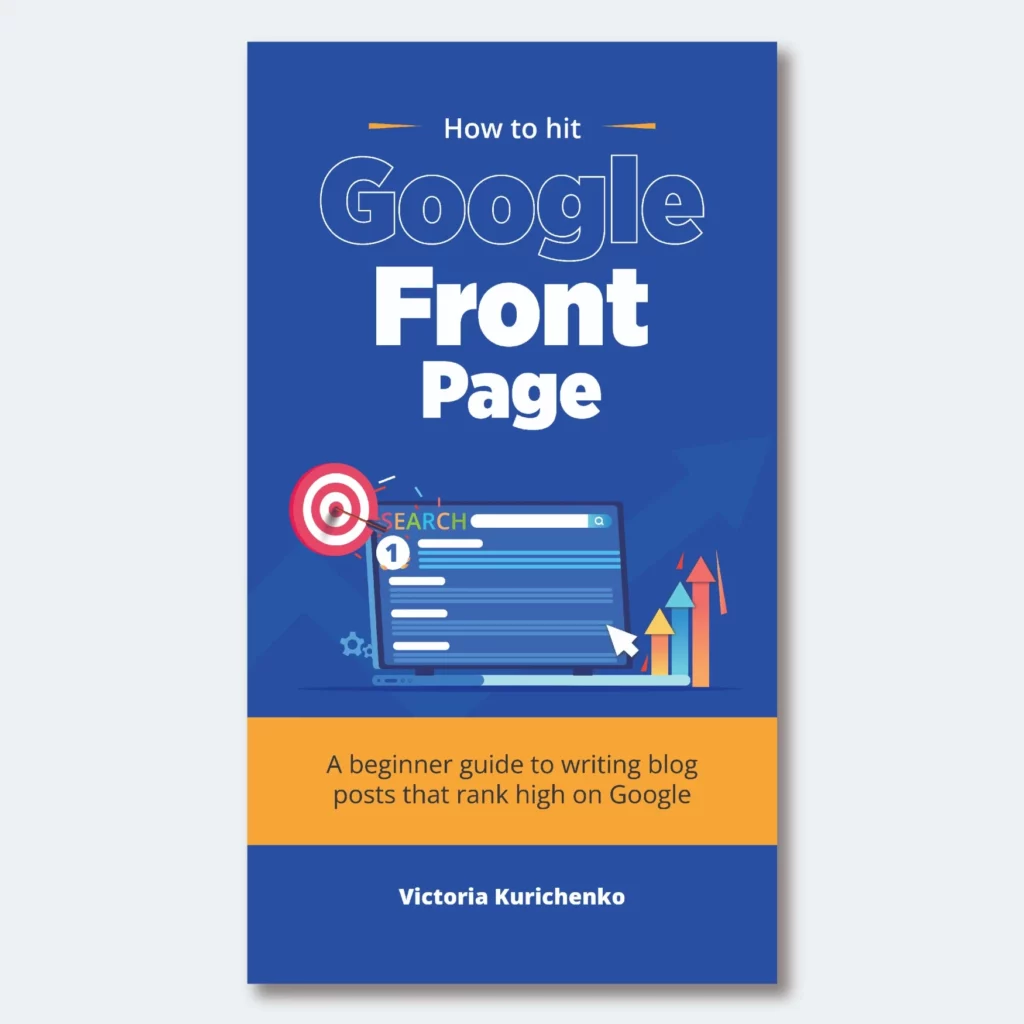

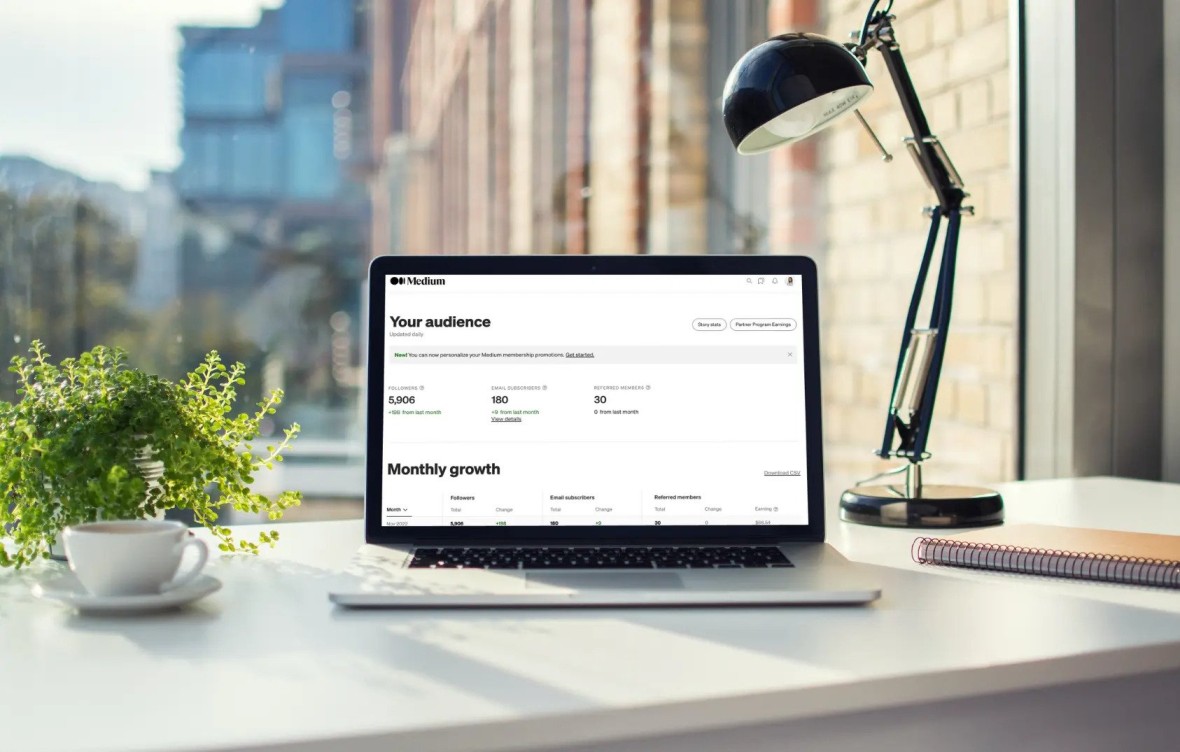
13 Responses
It’s exhausting to search out educated individuals on this topic, but you sound like you understand what you’re talking about! Thanks
An interesting discussion is worth comment. I think that you should write more on this topic, it might not be a taboo subject but generally people are not enough to speak on such topics. To the next. Cheers
The value of this blog post is beyond marvelous.
Thanks, Victoria.
Much love from Cameroon 🇨🇲-Africa.
hello mam, I have a blog about dating and relationship stuff like that. Do medium articles rank on Google with this specific niche? If not can I use Google Sites to create a blog post? Thank you! Hope you reply to me soon.
Hi Shawn,
Thanks for your question. 🙂
“Relationships” is one of the biggest Medium topics. If you publish an optimized article at one of the top Medium publications, such as Mind Cafe, Relationship Rules, Hello Love, you can reach the target audience on Medium and on search.
In case your article gets popular on Medium, Google might notice it and boost its ranking on search. Since Medium had a pretty high DR (domain rank) 94/100, chances are pretty high to outrank rivals for long-tail, low competition keywords.
If you are unsure whether to post an article on Medium or your website, consider your goals. If you want to build your website, advertise your products or services within your content and run ads, then you can do it all on your own website. Medium has strict editorial rules. They can give your content a huge boost in views, but you can only insert one humble CTA in it.
I hope my answer is helpful. 🙂
Have a wonderful day!
Victoria
Got it. Thanks for sharing, Victoria ????
I’m just always curios about the tools which bloggers, writers and copywriters use.
You are welcome, Paul!
Thanks for the blog post idea, btw. 🙂 I’ll think about how I can share more about what I do and which tools I use.
Victoria, thank you very much for outlining all things in such details.
That was very informative and relevant to me.
It was a pleasant surprise to know Medium actually supports the rel=”canonical”.
It effectively solves my previous concern 🙂
I’ve just read one of your articles on Medium a couple of minutes ago. Felt kind of inspired and decided to leave a comment here 🙂
One question actually popped up in my mind – could you describe what is your usual writing flow process? How do you usually approach writing such an in-depth SEO article, what tools (except for Ahrefs, of course) you usually use?
Thank you!
Hi Paul,
Thank you for reading my articles, and I am happy to hear you find them helpful. 🙂
I do in-depth keyword research before writing an article. Keyword research helps understand what people are interested in and look for online. The search terms help me create the article’s outline.
The next step is writing. I am not in a rush to publish my articles. Instead, I take time to examine the content on the first Google page and make sure my article shares something unique with readers, which was not shared by anyone before.
Regarding the tools, I use Grammarly and the Hemingway app to check my writing before publication.
I hope it answers your question! 🙂
Yes, it does. Thank you.
But actually partially 🙂
I was also curious – what writing processor you usually use? It is just in Google Docs, or perhaps something like Typora, or similar?
Google Docs is my favorite and I use it most of the time. 🙂
However, if I am on my way, I write in Evernote and notes.
Having read this I thought it was extremely informative. I appreciate you finding the time and energy
to put this content together. I once again find myself spending a lot of time both reading and commenting.
But so what, it was still worth it!
Hello Cialis,
Thank you so much for reading my article and I am happy to hear the content is useful for you. You are right, it takes time to produce an in-depth article, but the quality is my number one priority.